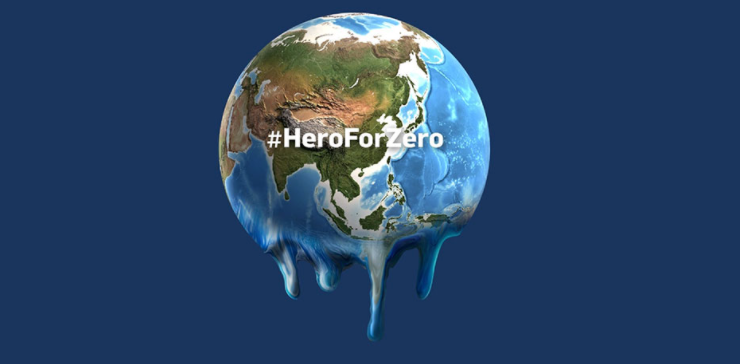The IWCA has stepped up its activity by adding new members – now up to – and publishing its first report into the best practice actions the wine industry can take to make their vineyards, land, soils and overall environment more carbon neutral.
Where would the wine industry be on tackling climate change without the leadership of Miguel Torres? Time and again over the last 15 years it has been Torres who has been willing to put his head above the parapet and speak out against what the wider wine industry is doing and try, and try again to find the right steps and methods that really combat the carbon and environmental impact that wineries all over the world have on the planet.
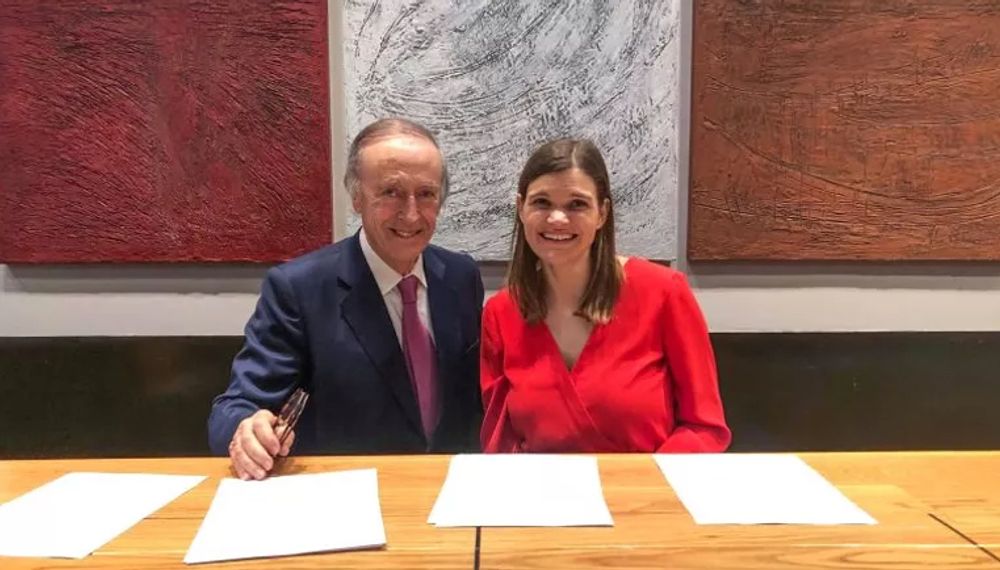
Miguel Torres and Barbara Banke coming together to set up the International Wineries for Climate Action
He has long spoken about the “climate change emergency” that everyone in the wine industry needs to wake up to. In recent years he has found an ally in Barbara Bank, owner of Jackson Family Wines in California, who together with Familia Torres launched the International Wineries for Climate Action group in 2019. Its aim is quite clear: for all its members is to achieve a 50% reduction in carbon emissions by 2030 and to become climate positive by 2050 for what are known as Scopes 1-3 emissions.
Torres was in London last month to help host a joint press conference with the United Nations Race to Zero leadership team. A significant step in its own right to have the UN working so closely with the efforts being made by wine industry to tackle climate change.
Interestingly Fiona Macklin, part of the UN Race to Zero team, stressed how important it was to have such a high profile consumer product as wine as part of its wider attempts to get leaders from across industry sectors, cities, regions and investment bodies to work together to hit short, medium and long term carbon neutral goals.
Wine, she said, can connect with the average shopper in the street far more than many other business sectors and has the ability to tell so many “personal stories” about the work individual families and well known wine brands are doing to address climate change.
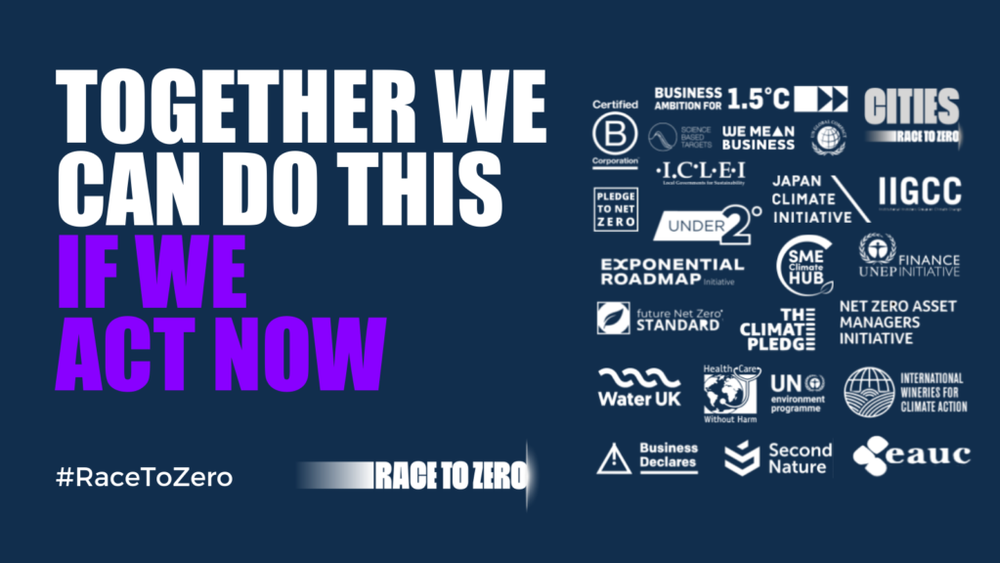
The UN’s Race to Zero campaign wants to galvanise business and city leaders to take real action on net zero carbon pledges
Wine, she added, can “help bridge that gap” between the consumer and industry as they can relate to the people behind the bottle of wine they are drinking. “Wine can provide real leadership in this space,” she said. “It can play a critical role in the behavioural changes that consumers make.”
It is also clearly one of the industry sectors right in the firing line of the damaging implications ofclimate change.
The UN Race to Zero campaign has so far got support from bodies that represent more than 12% of the global economy – including 471 cities, 1,675 companies, 569 universities, and 85 investors.
Macklin said it is hoped the Race to Zero campaign can build such a momentum that it creates a “Fear of Missing Out” amongst business leaders who feel compelled to join up. The challenge is to to build the “critical mass” from which “everything will accelerate” and “it makes it easier for others to join”.
Galvanise support
The IWCA now hopes it can, with the UN support behind it, use that same momentum to galvanise more wine producers to sign up and join the 10 members, stretched across Australia, Chile, New Zealand, Portugal, Spain and the US.
Torres is forever hopeful his and the IWCA’s efforts will convince more to either join, or at least follow the best practice methods they are deploying. He hides his feelings well, but it is clear he is frustrated that more producers are not playing their part.
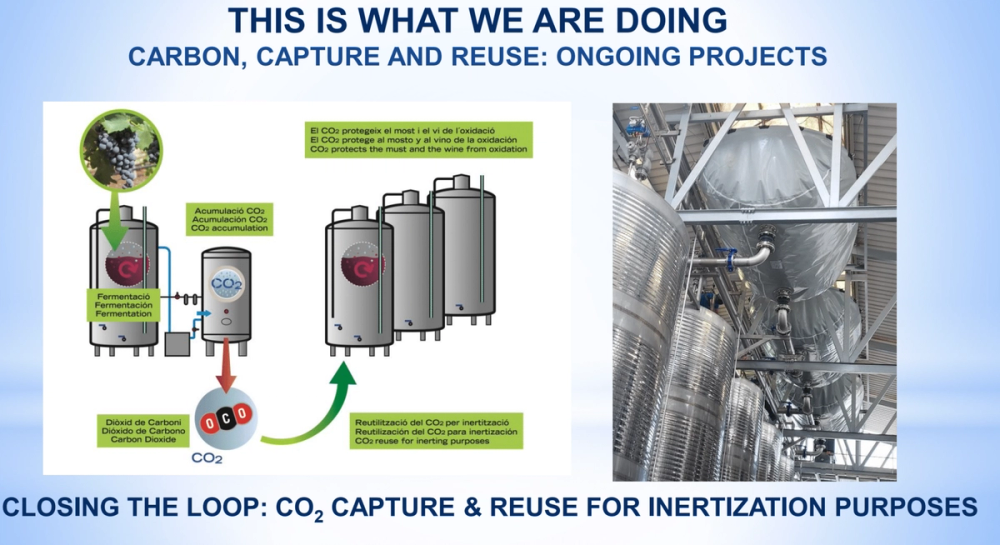
Here’s how Familia Torres is taking action in its own wineries to not only capture CO2 but re-use it
The situation facing the global wine industry, he stressed, is far more catastrophic than the outbreak of phylloxera. That proved to be a disaster it could recover from. There is no escape or return to normal from climate change.
In Rob Symington, though, he has an ally capable of taking the climate change message forward and potentially connect with a different, younger audience. Symington is part of the next generation of the inspirational and highly influential Symington Family Estates, which has done so much to drive climate change practices through the Douro Valley and Portuguese wine sector.
He agreed there was very much a need for a “cultural change” to take place in many, particularly traditional, parts of the wine industry.
“We are used to profit and loss, marketing and sales strategies and strategic plans. This is taking us outside our comfort zone in the wine trade,” he said.
But there is now an opportunity for potentially younger leaders to emerge that can really give fresh impetus to what the wine industry is doing to really tackle climate change.
The IWCA hopes to play its part by setting the examples, providing the benchmarks, and establishing the standards and protocols that wineries, big or small, can take. Measures that crucially will be supported by evidence and fact-based research that prove they work.
That is what is needed if we are to really address the dangerous rises in average temperature that threaten so much of the world’s current vineyard areas.
How serious are you?

Rob Symington says wine producers need to measuring and use data to show the steps they are taking to tackle climate change
Symington said there were two key questions any wine producer serious about doing anything to combat climate change: Are you recording and analysing your end-to-end carbon footprint and emissions right through your own supply chain, including your suppliers and customers?Then how are you measuring that in a way that allows you to know and understand whether the changes you are making are having any credible impact.
If you are not doing those two things, side by side, then a lot of the steps being taken by producers are effectively negated, claimed Symington.
Understanding the facts, figures and economic impact taking action on climate change can have will help bring about that much needed “cultural” change that is needed in the wider industry, he added. “We need to make the business case as well.” Which is what Symington Family Estates has done by becoming the first Portuguese wine producer to be B Corp rated.
But he also accepted the Symington business has also had to go through its own change in strategy on climate change and rather than see it as a threat, turn the situation on its head and regard “sustainability” as paramount to its business – “a core pillar of risk management in our business…a catalyst for transformation and as a way to future proof what we are doing”.
To be a member of the IWCA you need to do a lot more than just pay an annual subscription and pledge you will be carbon neutral by 2050. You have to prove you are taking the necessary steps – every year. Members must agree to have an annual third-party audited greenhouse gas emissions inventory that assess the steps producers have taken to invest in renewable energy. They are also have to demonstrate the steps they are taking to reduce CO2 emissions from a baseline inventory year in line with the overarching Net Zero target.
Symington and Torres acknowledged it was difficult to get some wineries on board and that taking on these issues was still a step too far for some. Torres, though, is hopeful there is slowly a “shift in mindset” across the industry and that being able to show “science based reduction goals” will convince more to sign up.
It is noticeable, however, that currently there are no French producers that have signed up to the IWCA considering the influence that France and its classic regions such as Burgundy and Bordeaux have on the rest of the world.
Consumer demand
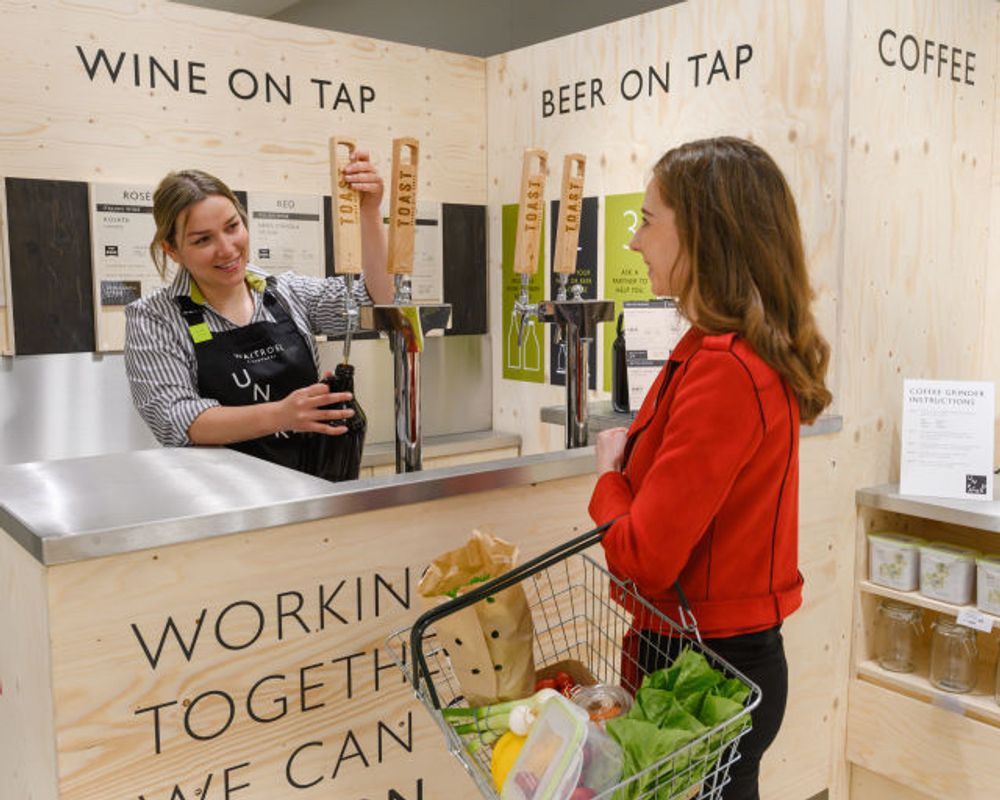
Waitrose has listened to its customers and introduced more eco-friendly and sustainable fixtures including recycling and self service stations to cut down on packaging.
It’s clear the average consumer believes the drinks industry needs to be doing more collectively to tackle climate change. New research released today by WRAP, the UK sustainability charity reveals the results of a consumer survey undertaken to coincide COP26. It reveals 60% of consumers want UK businesses to act immediately on climate change, while around a third feel the UK is behind other countries in delivering on climate change targets. In terms of food and drink businesses the survey found:
- Almost a third (29%) think that food and drink businesses in the UK are behind other countries in delivering on climate change targets
- 41% want businesses to be transparent on climate targets so they can be held accountable
- 40% believe businesses should be working with each other to tackle climate change issues within their sector or industry
- Four in ten (42%) said they thought UK businesses should have a clear step-by-step plan in place to reach their climate goals and 41% said that businesses should be transparent on their targets as well as regularly publishing their progress so that they can be held accountable.
Not words but action
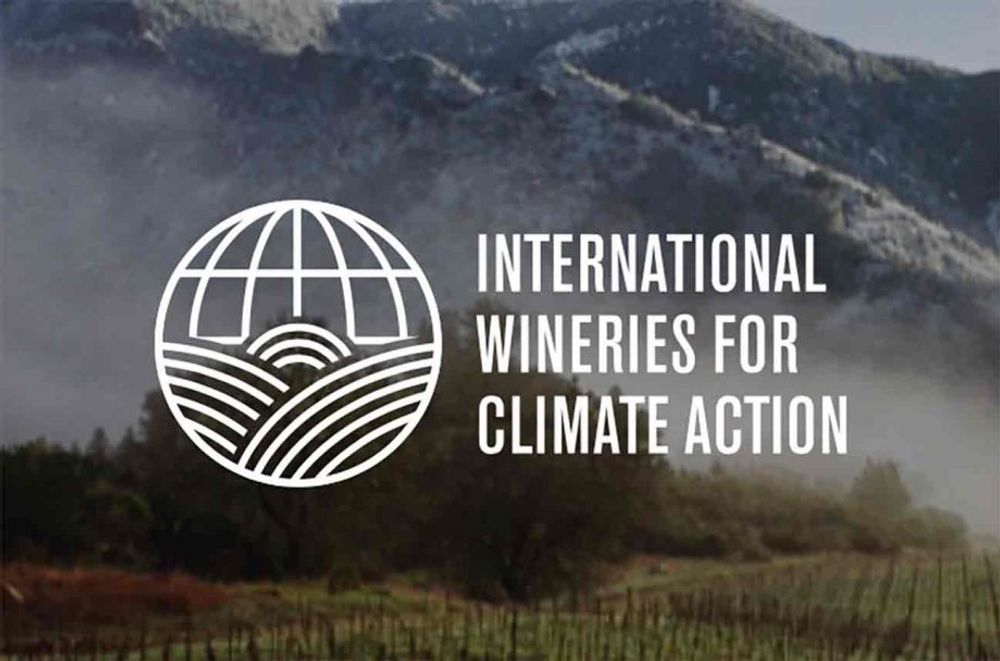
The IWCA wants to give wineries the help and support and a roadmap to make effective climate action changes
The job of the IWCA is to provide “not just words” but the leadership and the tools to help wineries make the necessary steps by sharing advice and support to each other. It is introducing a bespoke climate change calculator to help wineries monitor and measure their own performance.
Symington said part of its job was to make the “business case” for producers to sign up. To show that by taking these carbon reducing measures you can actually save money and help your bottom line. He said we need to look at our CO2 emissions as like “another currency” a “new accounting” that we are all going to have to make part of our business life.
The IWCA, stressed Symington, was “about measurement and rigour – about sharing best practice”.
Torres said he was particularly against those companies that use “offsetting” as their stance on climate chain and using it more as “a PR exercise”. Not only is it not actually making any difference to overall CO2 levels, it is stopping them taking the real actions needed, he added.
Torres, though, stressed he was “forever optimistic” and he is encouraged to see more producers from right around the world, like India, looking to take the necessary steps to move forward.
He said he would give him great pride if wine could be “seen as a symbol” of the great steps being taken by industry to tackle climate change. One thing is for sure he will carry on leading from the front taking those steps first.
- To find our more about IWCA click here.
- To see who is a current member click here.
- You can read the IWCA new annual report on the actions it is taking here.
IWCA Membership Criteria
Applicant Member: Any winery interested in becoming an IWCA member but that has not yet fulfilled the GHG inventory requirement can join IWCA as an applicant. The winery must demonstrate positive intent by taking steps to calculate and verify their emissions. Applicants have one year to meet IWCA membership requirements and become a Silver- or Gold-level member.
Silver Medal:
Requirement 1: Commit to becoming net zero by 2050 across Scopes 1-3, ensuring constant reductions to meet intermediate targets by 2030, in alignment with the United Nations’ Race to Zero campaign.
Requirement 2: Complete a minimum baseline third-party-verified GHG inventory for a standardised set of emissions categories across Scopes 1-3 (using the World Resources Institute’s GHG Protocol and ISO-14064 process), including 90% of the organisation’s volume within the region where its main winery is located.
Gold Medal: Must fulfil requirements 1 and then the following steps 3 and 4.
Requirement 3: Have winemaking operations be at least 20% powered by onsite renewable energy, as certified by independent audit.
Requirement 4: Demonstrate a constant reduction of CO2 emissions from a baseline emissions inventory year, as proof of proactive ongoing commitment. This percentage is dependent on the baseline year and is proportional towards the winery’s net zero target for 2050.
